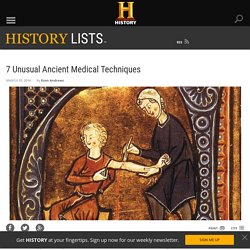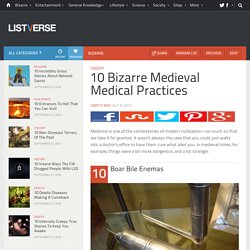

Tony Robinson on the top five superstitions that gripped medieval Britain. Ancient Britons didn’t despatch people willy-nilly, but in times of crisis – if a whole community was rocked by plague, say – then they might decide to sacrifice somebody as a way of bartering with the gods. In some cases, a wicker pyre in the shape of a man would be stuffed with animals and even human offerings. We can trace this practice back to Celtic times. The Celts saw the world in which they lived as crammed full of gods. To appease them, they would sacrifice something important: tools, jewellery, a sword (which would be as valuable as a car in today’s terms), slaves or, ultimately, members of the community. This ritual only ended when new religions, like Mithraism and Christianity, took hold.
Malleus Maleficarum, a handbook explaining how to identify, capture and kill a witch, was first published in Germany in 1487 and then circulated around Europe, stoking hysteria about witchcraft. Changelings Possession Vampires. 7 Unusual Ancient Medical Techniques - History Lists. For thousands of years, medical practitioners clung to the belief that sickness was merely the result of a little “bad blood.”

Bloodletting probably began with the ancient Sumerians and Egyptians, but it didn’t become common practice until the time of classical Greece and Rome. Influential physicians like Hippocrates and Galen maintained that the human body was filled with four basic substances, or “humors”—yellow bile, black bile, phlegm and blood—and these needed to be kept in balance to maintain proper health.
With this in mind, patients with a fever or other ailment were often diagnosed with an overabundance of blood. To restore bodily harmony, their doctor would simply cut open a vein and drain some of their vital fluids into a receptacle. In some cases, leeches were even used to suck the blood directly from the skin. While it could easily result in accidental death from blood loss, phlebotomy endured as a common medical practice well into the 19th century.
10 Bizarre Medieval Medical Practices. Creepy Medicine is one of the cornerstones of modern civilization—so much so that we take it for granted.

It wasn’t always the case that you could just waltz into a doctor’s office to have them cure what ailed you. In medieval times, for example, things were a lot more dangerous, and a lot stranger. 10 Boar Bile Enemas Enemas in medieval times were performed by devices called clysters. Even kings were high up on the clyster. 9 Urine Was Used As An Antiseptic Though it may not have been common, there is evidence to suggest that urine was occasionally used as an antiseptic in the Medieval Era. This isn’t quite as insane as it seems: urine is sterile when it leaves the body and may have been a healthier alternative than most water—which came with no such guarantee of cleanliness. 8 Eye Surgery (With A Needle) During the Middle Ages, cataract surgery was performed with a thick needle.
Of course, eye surgery changed rapidly once Islamic medicine began to influence European practices. 4 Trepanning. 10 Completely Uncanny Superstitions From The Middle Ages. Weird Stuff In the pre-scientific Middle Ages, the world was at the same time both fascinating and frightening.

In the absence of proper knowledge, people had no choice but to fall back on their own imaginations to make sense of the myriad natural phenomena around them. The result was a world where everything seemed magical, a place teeming with angels and demons, fairies and goblins, elves, gnomes, and witches. This list takes us inside the medieval mind and the fears and superstitions through which it tried to explain the world. 10 The Sea In The Sky For this story, we are indebted to English chronicler Gervase of Tilbury and his work Otia Imperiala. For proof, Gervase offers an episode that took place in an English village. Another tale concerns a merchant who accidentally dropped his knife while out at sea. 9 Omens Of Charlemagne’s Death The Frankish king Charlemagne was crowned Holy Roman Emperor in A.D. 800. 8 Magonia 7 Changelings 6 The Royal Touch 5 The Wild Man Of Orford. The Middle Ages: Feudal Life.